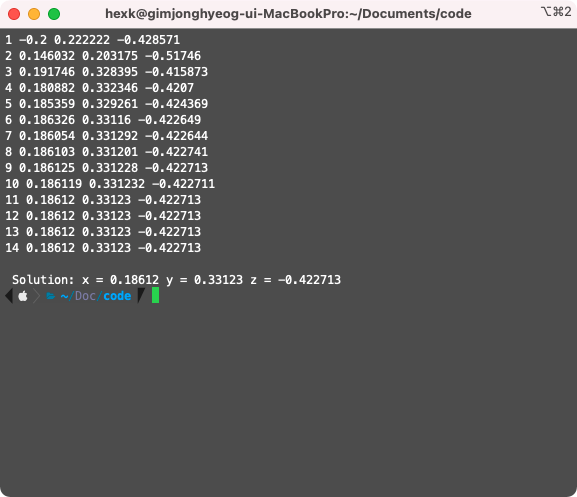Linear Algebra & C++: The Jacobi Method
Concepts
The Jacobi Method
For each \(k \geq 1\), generate the components \(x_{i}^{(k)}\) of \(x^{(k)}\) from \(x^{(k-1)}\) by
\[x_{i}^{(k)} = \frac{1}{a_{ii}}\left[\sum_{j=1, \\ j \neq i}^{n} (-a_{ij}x_{j}^{(k-1)}) + b_{i} \right]\text{, for } i=1,2, \cdots, n\]Questions
Question 1
Solve the system of equations using Jacobi Iteration Method.
\[\begin{cases} 5x-2y+3z=-1 \\ -3x+9y+z=2 \\ 2x-y-7z=3 \end{cases}\]Answers
Answer 1
#include <iostream>
#include <math.h>
#define f1(x, y, z) (-1+2*y-3*z)/5
#define f2(x, y, z) (2+3*x-z)/9
#define f3(x, y, z) (-3+2*x-y)/7
using namespace std;
int main(void) {
double error;
double xi=0, yi=0, zi=0;
double xf, yf, zf;
double error1, error2, error3;
int count = 1;
cout<<"Allowable Error: ";
cin>>error;
do {
xf = f1(xi, yi, zi); yf = f2(xi, yi, zi); zf = f3(xi, yi, zi);
cout<<count++<<' '<<xf<<' '<<yf<<' '<<zf<<endl;
error1 = fabs(xi - xf); error2 = fabs(yi - yf); error3 = fabs(zi - zf);
xi = xf; yi = yf; zi = zf;
}while(error1 > error && error2 > error && error3 > error);
cout<<"\n Solution: x = "<<xf<<" y = "<<yf<<" z = "<<zf<<endl;
return 0;
}
Results
Result 1


댓글남기기